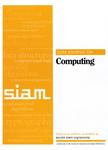版权所有:内蒙古大学图书馆 技术提供:维普资讯• 智图
内蒙古自治区呼和浩特市赛罕区大学西街235号 邮编: 010021

作者机构:Hebrew Univ Jerusalem Dept Econ IL-34787 Jerusalem Israel Hebrew Univ Jerusalem Sch Comp Sci & Engn IL-34787 Jerusalem Israel
出 版 物:《SIAM JOURNAL ON COMPUTING》 (工业与应用数学会计算杂志)
年 卷 期:2011年第40卷第6期
页 面:1892-1912页
核心收录:
学科分类:07[理学] 070104[理学-应用数学] 0701[理学-数学] 0812[工学-计算机科学与技术(可授工学、理学学位)]
基 金:Israel Science Foundation USA-Israel Bi-national Science Foundation
主 题:interdomain routing Border Gateway Protocol (BGP) security distributed algorithmic mechanism design communication complexity
摘 要:We present a game-theoretic model that captures many of the intricacies of interdomain routing in today s Internet. In this model, the strategic agents are source nodes located on a network, who aim to send traffic to a unique destination node. The interaction between the agents is dynamic and complex-asynchronous, sequential, and based on partial information. Best-reply dynamics in this model capture crucial aspects of the de facto standard interdomain routing protocol, namely, the Border Gateway Protocol (BGP). We study complexity and incentive-related issues in this model. Our main results show that in realistic and well-studied settings, BGP is incentive-compatible. That is, not only does myopic behavior of all players converge to a stable routing outcome, but no player has motivation to unilaterally deviate from BGP. Moreover, we show that even coalitions of players of any size cannot improve their routing outcomes by collaborating. Unlike the vast majority of works in mechanism design, our results do not require any monetary transfers (to or by the agents).